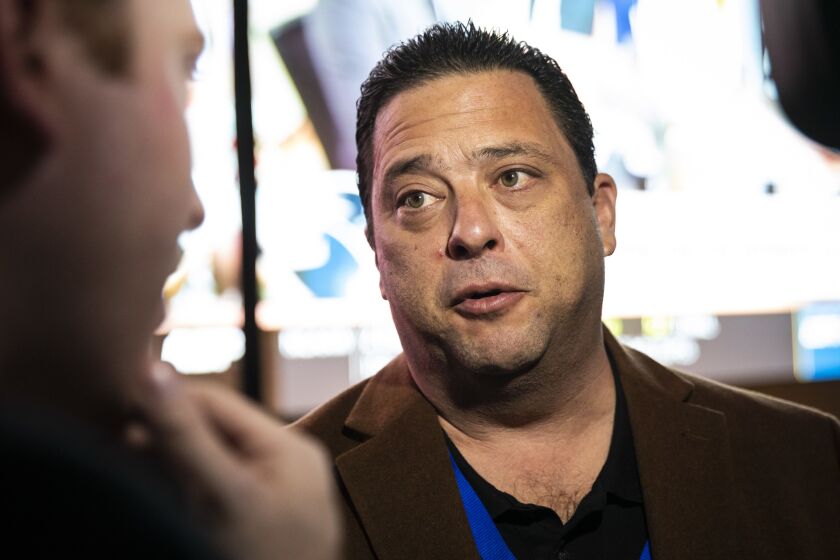SPRINGFIELD — Lawmakers Saturday night approved a Chicago casino, a feat decades in the making, as the Illinois General Assembly worked into the late hours to approve a $41 billion “maintenance” budget plan that’s largely reliant on borrowing and hope that the federal government will further help Illinois with COVID-19 relief.
A pandemic spending package to get Illinois through the rest of the year, and next, passed early Sunday. Saturday marked the fourth day of an unprecedented special session.
The Illinois Senate approved the casino plan 42-14, and it will be sent to Gov. J.B. Pritzker’s desk. It marked a huge feat for Mayor Lori Lightfoot, who achieved what several Chicago mayors couldn’t.
Bill sponsor Sen. Bill Cunningham, D-Chicago, said the state’s capital programs will get $45 million upfront in licensing fees before the casino is even opened. And the state will receive an additional $700 million in a re-worked reconciliation fee.
“It’s fair to say that over the next handful of years, the Chicago casino is going to provide hundreds of millions of dollars, indeed well over a billion dollars to our capital program,” Cunningham said.
The revenue from the casino would also help the city’s desperately underfunded police and fire pensions. The measure that passed restructured the Chicago casino tax rate structure that a feasibility study last year called “onerous.” It also changes the reconciliation fee payments for all casinos from two years to six years, and it allows for new gaming applications to have more time to pay licenses if the Illinois Gaming Board grants them. That would be switched from July 2020 to July 2021. The delay is intended to help casinos that are currently closed due to the pandemic.
The casino plan earlier cleared the Illinois House 77-32 with some bipartisan support. Eighteen House Republicans voted for the measure.
Bill sponsor Rep. Bob Rita, D-Blue Island, credited Lightfoot’s “tenacity” in pushing for the measure, in his closing remarks.
The legislation also included technical changes for the Danville casino, and it addresses a procurement issue for video poker machines at the Illinois State Fair in Springfield and the DuQuoin State Fair.
For most of the day, legislators reworked key provisions in the $41 billion spending plan. Emotions were heightened just after midnight Saturday when the Illinois House took up the budget implementation plan.
Illinois House Republican Leader Jim Durkin, R-Western Springs, called the entire special session and budget plan “the same old song and dance, the same movie you’ve watched 20 times before.” He said legislators made no efforts to reform ethics, pensions or property taxes.
House Majority Leader Greg Harris, D-Chicago, in turn acknowledged the plan “may not be the world’s best budget.” And he pointed out that Republicans largely fought alongside former Republican Gov. Bruce Rauner during a historic budget impasse.
“But at least we have a budget,” Harris said. “And to be lectured by some people who for two years let another governor run this thing with zero budget and running up a $17 billion backlog of bills, is an interesting experience,” Harris said, before the House approved the bill 62-47.
Earlier in debate of the spending measure, Democrats called the plan a way to get through the worst of times. Republicans called it a power grab by Pritzker, whom they said would have the control of billions of dollars in federal funds.
A measure cleared Friday allows for the authorization of $5 billion in borrowing from the Federal Reserve’s newly created Municipal Liquidity Facility authorized under the CARES Act, which is being used to balance the budget.
“This crisis has taken a toll on us all, physically, emotionally, spiritually,” Harris said. “There are a lot folks who need help out there across the state of Illinois. And we have a chance to make that help available. And again, this would be paid by the federal government.”
The budget maintains funding for most of state operations, and it helps health care agencies that have been deeply affected by COVID-19.
The budget also includes $20 million grants from the Illinois Department of Public Health to nine hospitals in the state, chosen by the highest percentage of Medicaid patients and aimed to help hospitals “disproportionately impacted by the COVID pandemic,” Harris said.
School districts will receive the same amount of funding as they received in 2020. The plan also keeps higher education spending flat to last year’s budget. It also fully funds the certified contributions for pensions.
“What we’ve heard today is a budget that is balanced only on a wing and a prayer. It relies on $5 billion in borrowing or magical revenue that comes from the federal government with no strings attached,” Rep. Tom Demmer, R-Dixon, said.
Demmer said it offers no government efficiencies and doesn’t include any proposed cuts recommended by Pritzker’s administration during normal operating times.
The budget debate gave Republicans the time to vent about what they said was a lack of communication with Pritzker’s office during the pandemic.
“We have not had a productive relationship with the governor’s office over many aspects to the stay-at-home order or the Restore Illinois plan,” Demmer said. “We’re told we’re heard and not necessarily seeing the results of that.”
Also, a measure to help struggling bars passed both chambers and will head to Pritzker’s desk. The legislation allows bars and restaurants to serve cocktails to-go. It requires that any curbside-cocktails be served in a sealed container and placed in the trunk of the car.
Municipalities would be able to opt out and create their own regulations for cocktails-to-go.
Tina Sfondeles reported from Chicago; Neal Earley reported from Springfield
Contributing: Mitchell Armentrout






